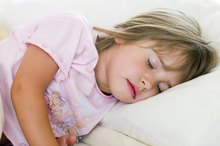Children experience tiredness from time to time, especially during their developmental years when they have growth spurts. Generally a nap and some rest will help to cure fatigue. If your child has an overwhelming need to sleep even after adequate rest, it could become problematic. Extreme fatigue in a child could indicate an underlying medical problem. It is important to find the cause of your child’s fatigue so he can receive proper diagnosis and treatment.
If you are experiencing serious medical symptoms, seek emergency treatment immediately.
Causes
There are several things that can cause extreme fatigue in children. Causes can include:
- depression
- cardiac or kidney disease
- allergies
- Epstein-Barr virus
- anemia
- unhealthy eating habits
- sedentary lifestyle
- lack of sleep
- viral infection
- certain types of immune disorders
Fatigue can result from many illnesses so it can be hard to pinpoint a diagnosis. Many doctors make a broad diagnosis of Chronic Fatigue Syndrome, also called CFS, if they are unable to find an underlying medical condition, explains the KidsHealth website 12. Narcolepsy is rare but serious condition that can cause extreme fatigue followed by sudden and uncontrollable episodes of falling asleep.
- There are several things that can cause extreme fatigue in children.
- Narcolepsy is rare but serious condition that can cause extreme fatigue followed by sudden and uncontrollable episodes of falling asleep.
Symptoms
What Are the Causes of a Constant Stomach Ache and Fatigue in Child ?
Learn More
Fatigue occurs when the body responds to needing rest and sleep. A yawn and the feeling of wanting to slow down or close your eyes and take a nap prove the most common signs. MedlinePlus states that other common symptoms of extreme or chronic fatigue can include:
- sore throat
- joint pain
- memory problems
- lethargy
- muscle pain
- sometimes enlarged lymph nodes in the neck 2
If your child’s fatigue is ongoing and symptoms of extreme tiredness last 6 months or longer, she may be diagnosed with CFS.
Warnings
When fatigue begins to disrupt your child’s lifestyle, education and quality of life, it becomes important to pinpoint why he is extremely tired. In rare cases, extreme fatigue combined with other symptoms such as weight loss, lack of appetite, nosebleeds, abnormal vision, lumps, headaches or pain could result due to certain types of childhood cancers such as leukemia. If your child is taking medications such as antidepressants, prescription pain medications, cough medicines and antihistamines, he may also experience fatigue and these symptoms should be immediately brought up to his pediatrician.
Treatment
My 3-year-old Is Tired All the Time
Learn More
Treatment for extreme fatigue in your child can be challenging unless she has been diagnosed with a medical condition or disease. Her physician will prescribe and suggest the best possible treatment by addressing the disease first to help eliminate the symptoms of fatigue. It may be as simple as switching the dose on an allergy medicine or eliminating antihistamines from treatment, explains WomensHealth.gov. Resting and making sure she gets plenty of rest overnight is an important part of treatment. Although no cure, treatment for narcolepsy may include selective serotonin reuptake inhibitors or stimulants to keep your child awake during the day.
- Treatment for extreme fatigue in your child can be challenging unless she has been diagnosed with a medical condition or disease.
- It may be as simple as switching the dose on an allergy medicine or eliminating antihistamines from treatment, explains WomensHealth.gov.
Outcome
Being able to once again participate in sports or daily activities without feeling weary or tired is the desired outcome. Learning to have your child pace himself without physically overworking will help with having energy throughout the day. A balanced diet rich in whole grains and protein while avoiding excess sugar and processed food will help ward off extreme tiredness. Implementing up to 30 minutes of light to moderate exercise daily will help keep his heart healthy and give him energy to get through the day.
- Being able to once again participate in sports or daily activities without feeling weary or tired is the desired outcome.
- Learning to have your child pace himself without physically overworking will help with having energy throughout the day.
Related Articles
References
- KidsHealth: Chronic Fatigue Syndrome
- MedlinePlus: Chronic Fatigue Syndrome Symptoms
- MayoClinic.com: Causes of Fatigue
- Matura LA, Malone S, Jamie-Lara R, et al. A Systematic Review of Biological Mechanisms of Fatigue in Chronic Illness. Biol Res Nurs. 2018 Jul;20(4): 410–421. doi:10.1177/1099800418764326
- Rothenthal TC, Majeroni BA, Pretorius R, et al. Fatigue: An Overview. Am Fam Physician. 2008 Nov 15;78(10):1173-1179.
- Office of Women’s Health. Chronic Fatigue Syndrome. Updated April 26, 2019.
- Medline. Fatigue. Updated July 31, 2019
- Stadje R, Dorniden K, Becker A, et al. The differential diagnosis of tiredness: a systematic review. BMC Fam Pract. 2016;17:147. doi:10.1186/s12875-016-0545-5
Writer Bio
Julie Boehlke is a seasoned copywriter and content creator based in the Great Lakes state. She is a member of the Society of Professional Journalists. Boehlke has more than 10 years of professional writing experience on topics such as health and wellness, green living, gardening, genealogy, finances, relationships, world travel, golf, outdoors and interior decorating. She has also worked in geriatrics and hospice care.









